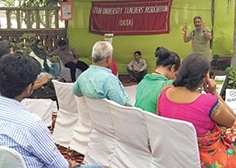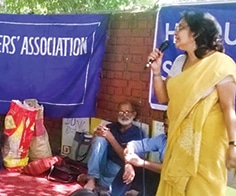
 The Choice-based Credit System (CBCS) is fast gaining a place in various institutions across India’s educational landscape. The University has approved the implementation of the CBCS, ending confusion among the candidates seeking for undergraduate programmes. Nidhi Sharma of Elets News Network (ENN) gets the view of the educationists on the pros and cons of the system.
The Choice-based Credit System (CBCS) is fast gaining a place in various institutions across India’s educational landscape. The University has approved the implementation of the CBCS, ending confusion among the candidates seeking for undergraduate programmes. Nidhi Sharma of Elets News Network (ENN) gets the view of the educationists on the pros and cons of the system.
The Indian Government recently made the Choice-based Credit System (CBCS) mandatory for all 400 public universities at the undergraduate and postgraduate level beginning in the academic year 2015-2016. After much debate and deliberations Delhi University approved the implementation of the CBCS from the upcoming session, ending the confusion among the students seeking admission to undergraduate courses. CBCS, which is practiced in many of the world’s acclaimed universities, has received mixed reactions in India from various educationists across the country.
Many claim that CBCS aspires to help India meet international standards in the world which today is a global village. On the other hand, the introduction of CBCS by few top government universities, such as the Delhi University (DU), is being vehemently opposed by various bodies, educationists and teachers.
In fact, DU’s programme to implement the CBCS has gone through very tough times.
CBCS-Journey so far
Initially, DU had decided to go ahead with the introduction of CBCS from the coming academic session, apparently without the ‘mandate’ of the varsity’s Executive Council. In an official communication to deans of all faculties on April 29, DU’s Joint Registrar (academics) directed them to start preparations for the implementation of CBCS. The registrar’s communication came after a meeting between the Vice- Chancellor, Dinesh Singh, and the deans to discuss its implementation on 23rd April, 2015.
Presently, DU’s Executive Council has approved the implementation of the CBCS from the upcoming session, ending confusion among candidates seeking admission to the undergraduate programmes, but things are not as simple
- Provides a ‘cafeteria’ approach in which the students can take courses of their choice, learn at their own pace, undergo additional courses, and acquire more than the required credits
- The grading system is considered ‘better’ and ‘desirable’ because this will facilitate student mobility across institutions within the country and across other countries, and also enable potential employers to assess the performance of students

Strict opposition followed by the staff associations of over 30 DU colleges who resolved against CBCS for a range of reasons. The Delhi University Teachers’ Association (DUTA) forwarded their resolutions to the University Grants Commission (UGC) that had posted the proposed structure and draft syllabi of 18 subjects on its website inviting comments. The UGC had advised the varsity to wait before putting the system into practice. Following this, DU said that in case the Executive Council decides against it, it would drop the idea.
Presently, DU’s Executive Council has approved the implementation of the CBCS from the upcoming session, ending confusion among candidates seeking admission to the undergraduate programmes, but things are not as simple. Major opposition still stands tall, severely criticising DU for this. Sources have informed Elets Technomedia that the council comprised 17 people, of which five were not in favour of CBCS being introduced.
Opposing the CBCS, DUTA President Nandita Narain says, “The CBCS is meant to majorly benefit only the private universities, and not institutions like Delhi University, which cater to a huge and varied population. Just like the Four-Year Undergraduate Programme (FYUP), CBCS is another experiment being conducted on students which will only make them suffer. CBCS is without any direction, a move taken without considering the infrastructure restraints of the university. The trend of earning credits and not undergoing the required rigour, satellite teachers and an online course will adversely affect the quality of students in our country.”
Narain further added, “UGC is not acting in a very responsible manner and again trying to push through a drastic change just before admissions are about to begin for the next academic session. The move is not very constitutional and ignores the fact that universities have been given the right to frame their own syllabi and curricula due to the mass population of students who come from all backgrounds.
DUTA member Saikat Ghosh explains, “The Delhi University teachers are not in favour of CBCS and there are numerous practical reasons for it. Importantly, CBCS requires the semester system which is not desirable in our present set-up. Firstly, the number of teaching days are very less in a semester which comprises six months and more importantly, semester system requires a system where the teacher caters to a small class. This is not workable, particularly in an institution as vast as DU which caters to thousands of students from a varied background, geographically, culturally, economically etc. It happens in private universities where the cost structure is very high. Furthermore, time is a major constraint.”
“The concept of common curriculum being propagated by the present government can’t be imposed. Where is the flexibility of choice provided? As far as the availability to choose from unique subject combinations is concerned, there is a serious derth of number of qualified teachers for the same. Regular and permanent appointments need to be made to ensure that teaching-learning is stable”, he adds.
Opining that we can’t only be experimenting with the future of students, Ghosh further said, “After all, what happened in the case of FYUP. Future of those students is still in a fix. The student count is rising exponentially while the infrastructure is not. In its financial budget, the government has reduced the allocation for education and this is a big setback. Many years back, Madan Mohan Malviya had said that if we want our country to rise in the next 30-40 years, we need to allocate at least 6 per cent of our total budget to education.
Under CBCS, students will be able to pursue three types of courses foundation, elective and core. Students must pursue core subjects every semester and are free to pick electives from a pool of subjects unrelated to their disciplines. This means if you are a computer science student, you can still opt for history as an elective
“We cannot blindly follow the US, we are not such a sound economy. Due to the OBC reservations and other factors, very soon there is going to be a huge mix of students’ population which will have the special need. The one-size-fits-all approach will not work and the government cannot be blind to the need of education, and has to stop experimenting with the students’ future. More concrete and developmental steps need to be taken in the field of education.”
The opinion of students is no different from that of their teachers. Mohammed Asif, a 2nd-year student of Aurobindo College, History Hons says, “Both CBCS and FYUP have common problems, completely ignoring the infrastructure capability of the University.” He threw further light on the problem of availability of experienced teachers, informing that there are 4,500 adhoc teachers in the university. “Furthermore, the syllabi of CBCS has not been prepared by the educationists of DU, but it is a bureaucratic syllabus. This is not desirable in education,” he said.

Madhurima Kundra, another DU student and member of All India Students Association (AISA) feels, “CBCS is a change which is being pushed by the UGC and MHRD without ample and adequate discussion with the primary stakeholders, i.e. teachers and students on the desirability, feasibility and long-term implications of such a systemic change. How can the students and teachers not be involved in a system which will bring a major impact in their educational life.”
Furthermore, Jawaharlal Nehru University Students’ Union (JNUSU) came together with DUTA and other students to show their support against the CBCS. Ashutosh Kumar, President, JNUSU, holds the view that it is about the coming together of all bodies to unite against the undemocratic decision to introduce CBCS.
Views in favour
In the midst of all this heated debate, many universities, particularly the private universities, have a very different take on CBCS. Nikhil Sinha, founding vice-chancellor, SNU, says, “We have been following the recently notified CBCS since 2011. Students have the option of pursuing programmes with major and minor combination, double majors and also have the option to change their major mid-way. The undergraduate programmes have been structured to allow flexibility to the students to design their own course and fulfill the credit requirements. This is in line with the UGC guidelines.”
According to Sinha, the new system would help in programme portability and institution portability. “However, it might be a challenge for a student of a small college to migrate to a university because of different accreditation processes. Thus it becomes imperative to strengthen the accreditation processes along with the credit system.”
Recently, a number of new generation private universities like Ashoka, Shiv Nadar and FLAME have adopted the interdisciplinary approach to higher education with success
- Noida-based Amity University introduced CBCS and credit transfer system in 2014-15
- Shiv Nadar University has been following CBCS since 2011
- Ashoka University’s curriculum is on the lines of UGC notified CBCS
This year, the Institute for International Education estimates that India is the number two country of origin for foreign students in the US, with over 1.2 lakh students studying there, contributing an estimated $3.3 billion. Therefore, a major percentage of the education fraternity decide on follow the internationally widespread CBCS. Under CBCS, students will be able to pursue three types of courses foundation, elective and core. Students must pursue core subjects every semester and are free to pick electives from a pool of subjects unrelated to their disciplines. This means if you are a computer science student, you can still opt for history as an elective. A study of varied subjects widens students’ horizon and exposure.
The current framework suggests allotting 50 per cent of the total credits to core subjects, 25 per cent to applied core subjects, 20 per cent to interdisciplinary subjects and five per cent for foundation courses. With this interdisciplinary approach, students can choose to develop different skills like communication, writing and debating through their electives and emerge as more employable individuals.
In this backdrop, where there are huge contradictions in views and perceptions are different, we need to understand that a particular system can have different implications in different situations and institutions. Maybe there can be a further exercise and better collaboration between the authorities involved, those implementing CBCS, and the students, whose future is at stake to come together and see what can be done to make a system successful and do away with its lacunae and problems.























